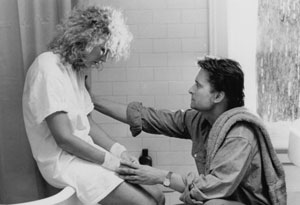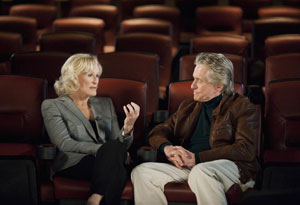Glenn Close and Michael Douglas' Fatal Attraction

Credit: Paramount Pictures
Fatal Attraction is the 1987 blockbuster that struck fear into the hearts of married couples across America. Michael Douglas stars as Dan Gallagher, a married lawyer who risks it all for a passionate weekend with a seductive stranger named Alex (Glenn Close). This one-time weekend fling twists and turns into a harrowing roller coaster ride as Alex's demented obsession slowly reveals itself.
Michael and Glenn were exceptional in the sexy thriller, which received a Best Picture Oscar®nomination. Glenn also received a Best Actress nomination for her role. Throughout her stellar career, Glenn has earned a total of five Oscar nominations, three Tony Awards® and three Emmys®, including back-to-back wins for her work on Damages.
After Fatal Attraction, Michael went on to star in Wall Street as Gordon Gekko, the role that scored him an Oscar for Best Actor. In spring 2010, he will revisit that role in the upcoming sequel, Money Never Sleeps.
Michael and Glenn reconnected in New York City to talk publicly for the first time about the film, those steamy scenes and why Glenn didn't like the ending.
Michael and Glenn were exceptional in the sexy thriller, which received a Best Picture Oscar®nomination. Glenn also received a Best Actress nomination for her role. Throughout her stellar career, Glenn has earned a total of five Oscar nominations, three Tony Awards® and three Emmys®, including back-to-back wins for her work on Damages.
After Fatal Attraction, Michael went on to star in Wall Street as Gordon Gekko, the role that scored him an Oscar for Best Actor. In spring 2010, he will revisit that role in the upcoming sequel, Money Never Sleeps.
Michael and Glenn reconnected in New York City to talk publicly for the first time about the film, those steamy scenes and why Glenn didn't like the ending.

Photo: ABC
Michael: [We're] talking about our little flick, which turned out to be this whole kind of phenomenon. So you read the script, and what was it?
Glenn: I read it in one sitting, and when I finished, my temperature had lowered. I felt cold coming out of it, I had been so focused. The only thing that bothered me was the rabbit.
Michael: It still does?
Glenn: I just thought it was over the top.
Michael: Did you have any concerns playing a villain?
Glenn: I never thought of her as a villain, ever. Ever. That was the movie I probably did the most research on in my whole career. I went to psychiatrists because I wanted to understand, number one, is it possible for somebody to have her behaviors—particularly the rabbit. And if it was, what would cause that? Through that journey of discovery, I was told, "Yes, absolutely. It is possible for somebody to do this." And so I always thought that she was a human being in a lot of pain and she needed a lot of help.
Glenn: I read it in one sitting, and when I finished, my temperature had lowered. I felt cold coming out of it, I had been so focused. The only thing that bothered me was the rabbit.
Michael: It still does?
Glenn: I just thought it was over the top.
Michael: Did you have any concerns playing a villain?
Glenn: I never thought of her as a villain, ever. Ever. That was the movie I probably did the most research on in my whole career. I went to psychiatrists because I wanted to understand, number one, is it possible for somebody to have her behaviors—particularly the rabbit. And if it was, what would cause that? Through that journey of discovery, I was told, "Yes, absolutely. It is possible for somebody to do this." And so I always thought that she was a human being in a lot of pain and she needed a lot of help.
Michael: We did a movie where we had a lot of sex scenes together and we tried to kill each other. Did you find it difficult doing in [this] film, or any more difficult than others?
Glenn: I felt I was in such a safe environment, and you were a fantastic partner with that. And I think we really believed it was extraordinary storytelling. You know, there were some scenes, like the elevator scene where I asked for a pitcher of margaritas and I drank probably half of it. And you were happy. [Laughs]
Michael: [Laughs] I was a happy guy. I was a very happy guy.
Michael and Glenn watch the scene where Alex slits her wrists.
Michael: I remember that moment in the theater. We were going along. It was intriguing and everything else, and that's when the audience went, "Ahh!"
Glenn: It was so brilliant to have the blood on your face because the audience didn't quite understand. And they are as shocked as [your character is].
Michael: I know you don't see Alex as a villain, but did it change your range of parts people thought of you for?
Glenn: Yeah, because people never thought I could be sexy. I'd never been asked to be sexy.
Glenn: I felt I was in such a safe environment, and you were a fantastic partner with that. And I think we really believed it was extraordinary storytelling. You know, there were some scenes, like the elevator scene where I asked for a pitcher of margaritas and I drank probably half of it. And you were happy. [Laughs]
Michael: [Laughs] I was a happy guy. I was a very happy guy.
Michael and Glenn watch the scene where Alex slits her wrists.
Michael: I remember that moment in the theater. We were going along. It was intriguing and everything else, and that's when the audience went, "Ahh!"
Glenn: It was so brilliant to have the blood on your face because the audience didn't quite understand. And they are as shocked as [your character is].
Michael: I know you don't see Alex as a villain, but did it change your range of parts people thought of you for?
Glenn: Yeah, because people never thought I could be sexy. I'd never been asked to be sexy.
In the original ending, Glenn's character got her final revenge on Dan by committing suicide, but framing him for her murder. When that ending fell flat with preview audiences, filmmakers replaced it with the now-famous finale where knife-wielding Alex returns to Dan's house, tries to kill him and is ultimately gunned down in the bathtub by Douglas' onscreen wife, played by Anne Archer.
Michael: I think we should talk about the ending.
Glenn: What happened with me is when I heard they wanted to make me into basically a psychopath—where I go after somebody with a knife rather than somebody who was self-destructive and basically tragic—it was a profound problem for me. As I told you, I did a lot of research about the character. And I felt, even though there were a lot of secrets and people might not have understood all the behavior, I did. So to be brought back six months later, I think it was, and told that you're going to totally change that character, it was very hard. I think I fought against it for three weeks.
Michael: Oh, you did.
Glenn: I remember we had meetings. I was so mad.
Michael: But you were so good in the part that everybody wanted you to be killed—viscerally wanted somebody to put their hands around your throat. And it was really a result of you being so good.
Michael: I was thinking. You're so good in this movie, Glenn, and your entire career. You hadfive Oscar nominations in the '80s. What an incredible run.
Glenn: You've won two Oscars—one for being a producer and one for being an actor. Which one were you most emotional about?
Michael: The acting. To receive that nomination from my fellow actors when you're second generation really meant a lot for me and helped me gain a lot more confidence.
Michael: I think we should talk about the ending.
Glenn: What happened with me is when I heard they wanted to make me into basically a psychopath—where I go after somebody with a knife rather than somebody who was self-destructive and basically tragic—it was a profound problem for me. As I told you, I did a lot of research about the character. And I felt, even though there were a lot of secrets and people might not have understood all the behavior, I did. So to be brought back six months later, I think it was, and told that you're going to totally change that character, it was very hard. I think I fought against it for three weeks.
Michael: Oh, you did.
Glenn: I remember we had meetings. I was so mad.
Michael: But you were so good in the part that everybody wanted you to be killed—viscerally wanted somebody to put their hands around your throat. And it was really a result of you being so good.
Michael: I was thinking. You're so good in this movie, Glenn, and your entire career. You hadfive Oscar nominations in the '80s. What an incredible run.
Glenn: You've won two Oscars—one for being a producer and one for being an actor. Which one were you most emotional about?
Michael: The acting. To receive that nomination from my fellow actors when you're second generation really meant a lot for me and helped me gain a lot more confidence.



